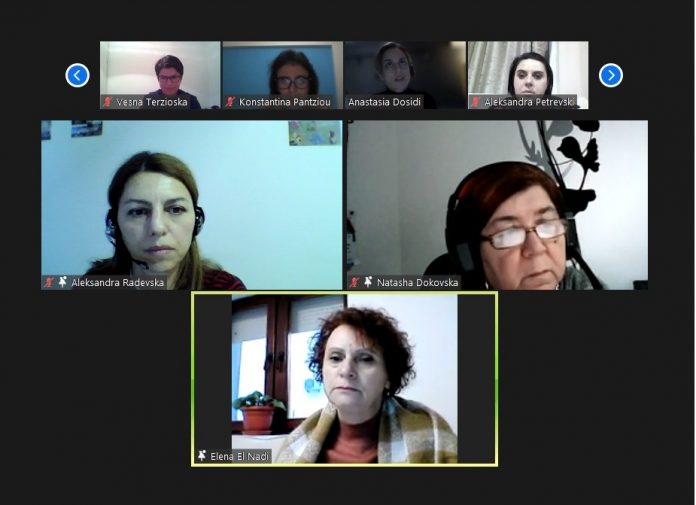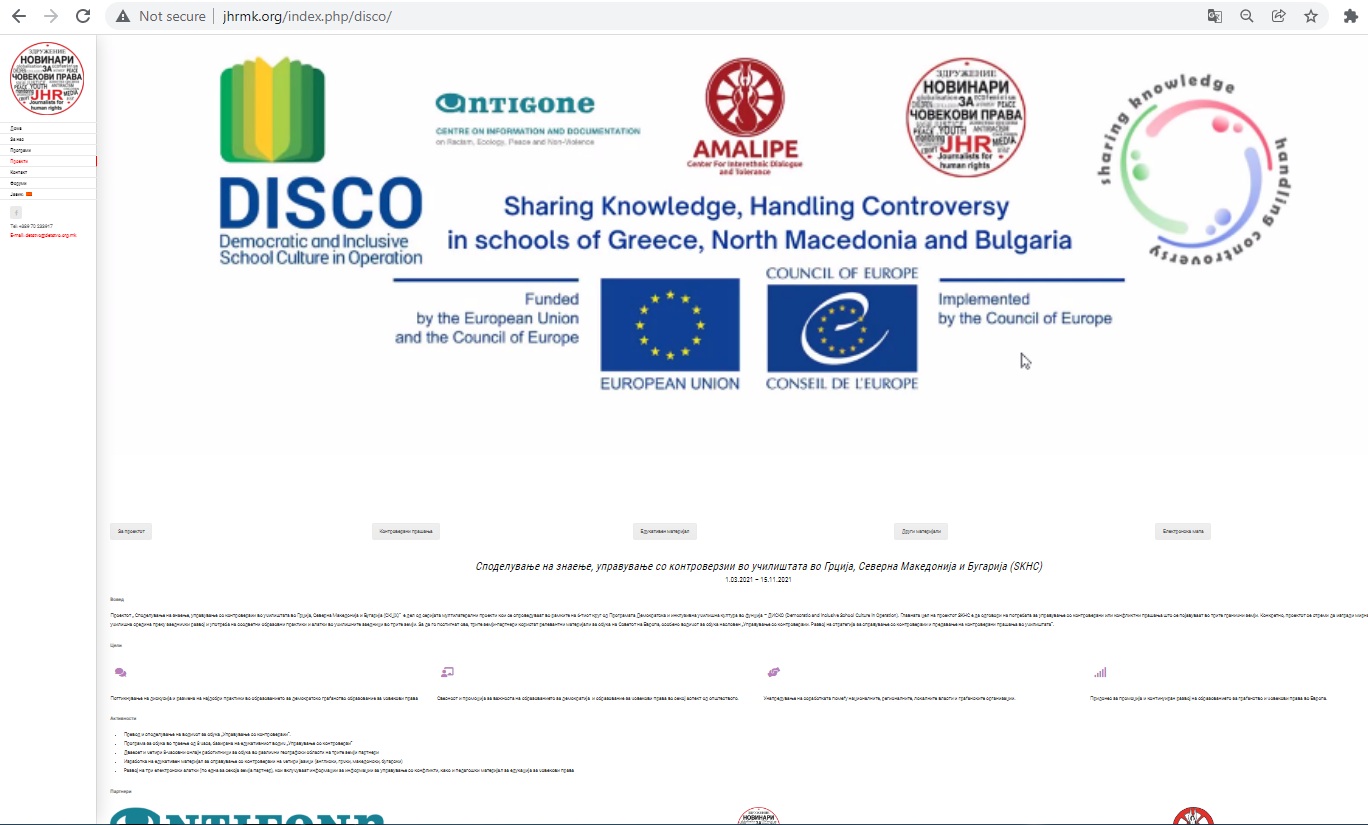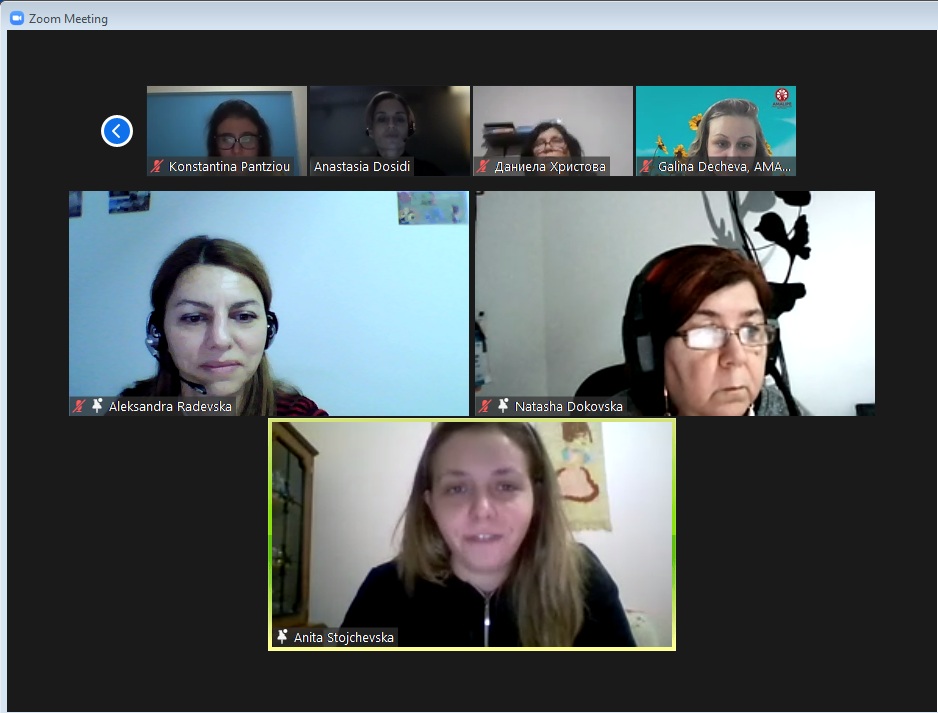By sharing the experiences and results of the project activities, the project partners ANTIGONE – Information and Documentation Center for Racism, Ecology, Peace and Nonviolence from Greece, Human Rights Journalists from Northern Macedonia, and Amalipe Center for Interethnic Dialogue and Tolerance from Bulgaria, and representatives of The teaching community of the three countries at the final conference held online on November 15 on the Zoom platform, completed the project “Sharing knowledge, handling controversy in schools in Greece, North Macedonia and Bulgaria.”
The project partners presented the key products developed under this project on the CoE/EU training tool for dealing with controversy “Managing controversy. Development of a strategy for dealing with controversy and teaching controversial issues in schools ” translated into local languages, 8-hour training program, educational manual and electronic tool for the teaching community from the three countries, which will be available to the wider teaching community through websites in local languages, as well as in English, in order to contribute to the development of a peaceful and inclusive school environment in the three partner countries (Bulgaria, Greece, North Macedonia).
A total of 606 representatives of the teaching community, from 11 regions of Greece, 6 regions of Bulgaria and 7 regions of North Macedonia, were part of the trainings in the project that was implemented from March 1 to December 15, 2021, within the Joint Program Democratic and Inclusive School Culture on Operation (DISCO), supported by funding from the Council of Europe and the European Union.
Representatives of the local teaching community (teachers, school principals, administrators, etc. in primary and secondary education) shared their positive experiences from the trainings and tools that will help them use the controversial issues as an opportunity for democratic dialogue and active participation in the context of their schools.
– Through the interactive workshops within this project and through the exchange of experiences we learned that controversies exist in schools and are an inevitable part of our work, but that they should be discussed, discussed and sought a solution to overcome. We have learned that there are informal tools that can help us to detect controversies, to approach them properly and to incorporate them into the realization of content in all subjects. These tools enable students to discuss given questions freely and without pressure, to express their own opinion and to have the right to disagree with another’s opinion. Teachers, on the other hand, give these informal tools the opportunity to experiment with students, to explore various topics that may have previously been resisted and banned or taboo – said Vesna Terzioska, pedagogue at the primary school “Vanco Nikoleski” from Leskoec, Ohrid.

Elena El-Nadi, director of the primary school “Vanco Nikoleski” from Leskoec, Ohrid, also spoke about the importance of dealing with controversies. from our team within this project, will certainly help us to do it even better. ”
Anita Stojceska, a special educator and rehabilitator from the Secondary School “Kiro Burnaz” from Kumanovo, is of the same opinion, pointing out that the benefit is especially great for the students themselves who are introduced to the ways of peaceful communication and conflict management.
Through the project, in addition to the teaching community, children and adolescent students were introduced to the ways of peaceful communication, cooperation and non-violent conflict resolution. The wider education community became aware of the importance of democratic human rights education and was encouraged to promote alternative educational practices towards inclusion.
The challenge remains the reluctance of schools to implement a comprehensive strategy for dealing with controversies involving all its members (administrative, teaching and non-teaching staff, students, parents), as well as the lack of opportunities for participants from teachers in the 3 countries to engage deeply and exchange of experiences and ideas for dealing with controversy given the limitations of direct communication due to the Covid-19 pandemic.
The project partners indicated that these trainings will continue after the completion of the project with all teaching communities that have expressed interest, and the developed “library” with information and educational material for dealing with school controversy (and other material related to human rights education) will be enriched and accessible to help address controversial issues and promote human rights education. The challenge remains to satisfy the interest of other specialists in the wider field of education to train – youth educators, psychologists, educators in extracurricular contexts, conflict resolution mediators, educational, intercultural community mediators, etc.
These new tools will be available to the wider teaching community in the country in print as well as in an electronic version on the Journalists for Human Rights website.





 Македонски
Македонски